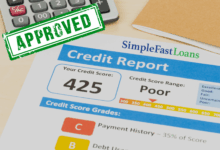Instant Payday Loans: A Comprehensive Guide
Instant payday loans offer quick access to cash, but understanding their implications is crucial. This guide explores the process, costs, risks, and alternatives to help you make informed decisions about using these short-term loans. We’ll delve into the details of eligibility, interest rates, and the potential long-term financial effects of relying on payday loans.
From the application process and associated fees to the legal protections available to borrowers, we aim to provide a balanced perspective. We’ll also examine responsible borrowing practices and explore viable alternatives that may better suit your financial needs. Making informed choices is paramount when considering any loan, especially one as potentially impactful as a payday loan.
What are Instant Payday Loans?
Instant payday loans are short-term, high-interest loans designed to provide borrowers with quick access to cash, typically until their next payday. They differ significantly from other loan types, such as personal loans or mortgages, primarily due to their short repayment period and the significantly higher interest rates involved. Unlike longer-term loans which are often used for larger purchases or debt consolidation, payday loans are intended for smaller, immediate financial needs.
Instant payday loans streamline the borrowing process to offer rapid access to funds. The application is usually completed online, and approval (if granted) and disbursement of funds can occur within minutes, hence the term “instant.” This speed is a key differentiator from traditional loans that involve extensive paperwork and longer processing times.
The Instant Payday Loan Borrowing Process
The typical borrowing process begins with an online application. Applicants provide personal information, including employment details and bank account information. The lender then assesses the application, typically using automated systems, and determines creditworthiness based on factors such as income and existing debts. If approved, the funds are usually transferred directly into the borrower’s bank account within minutes. Repayment is typically due on the borrower’s next payday. The entire process, from application to receiving funds, is designed for expediency.
Eligibility Criteria for Instant Payday Loans
Eligibility for instant payday loans typically involves meeting specific criteria. Lenders generally require borrowers to be employed or have a regular source of income, possess a valid bank account, and be of legal age. While a credit check might be performed, it’s often less stringent than for traditional loans. However, borrowers with poor credit history may still face higher interest rates or may be denied altogether. The specific requirements vary among lenders.
Situations Warranting Consideration of an Instant Payday Loan
Instant payday loans might be considered in situations requiring immediate financial assistance for unexpected expenses. Examples include covering an unexpected medical bill, repairing a broken-down vehicle, or paying for essential home repairs. However, it’s crucial to understand the high cost of these loans and to explore alternative financing options whenever possible. Using a payday loan to cover recurring expenses or to pay off existing debt is generally not recommended due to the high interest charges and potential for a debt cycle. For example, someone facing an unexpected car repair bill of $500 might consider a payday loan as a short-term solution, but only if they have a reasonable plan to repay the loan in full on their next payday.
Interest Rates and Fees
Instant payday loans, while offering quick access to cash, often come with substantial interest rates and fees. Understanding these costs is crucial before considering this type of borrowing, as the high charges can quickly lead to a cycle of debt. This section will delve into the specifics of these costs, comparing them across different lenders and highlighting the potential for significant financial burdens.
The interest rates and fees associated with instant payday loans vary considerably depending on the lender, the loan amount, and the borrower’s creditworthiness. Some lenders advertise low initial fees or interest rates, but these can be misleading. Hidden fees, high APRs (Annual Percentage Rates), and rollover charges can quickly escalate the total cost of the loan far beyond the initial amount borrowed. It’s vital to carefully examine the terms and conditions of any loan offer before signing.
Comparison of APR and Fees Across Lenders
The following table illustrates the significant differences in APR and fees that can exist between various instant payday loan providers. Note that these figures are examples and actual rates and fees may vary. It’s essential to always check the lender’s website for the most up-to-date information. Always compare offers from multiple lenders before making a decision.
| Lender | APR | Loan Amount | Fees |
|---|---|---|---|
| Example Lender A | 400% | $500 | $75 |
| Example Lender B | 350% | $300 | $50 |
| Example Lender C | 500% | $200 | $40 |
| Example Lender D | 450% | $400 | $60 |
As the table demonstrates, APRs can easily exceed 400%, meaning that a borrower could pay back significantly more than the original loan amount. The fees, which can include origination fees, late payment fees, and rollover fees, further increase the total cost. For example, a $500 loan with a $75 fee and a 400% APR could result in a significantly higher repayment amount than initially anticipated.
Potential for High-Interest Charges and Fees
The potential for high-interest charges and fees with instant payday loans is a major concern. These loans are often marketed as short-term solutions, but the high costs can make them difficult to repay within the short timeframe, leading to a cycle of debt. Borrowers may find themselves repeatedly taking out new loans to pay off old ones, accumulating substantial interest and fees in the process. This can quickly lead to a serious financial crisis.
For instance, a borrower who takes out a $300 payday loan with a 400% APR and a $50 fee might find themselves owing significantly more than the original loan amount after just a few weeks, even if they make timely payments. The high interest and fees can quickly overwhelm a borrower’s budget, making it nearly impossible to escape the debt trap.
Risks and Consequences
Taking out an instant payday loan can seem like a quick solution to a financial emergency, but it’s crucial to understand the potential risks and consequences before borrowing. These loans often come with high interest rates and fees, which can quickly spiral into a cycle of debt if not managed carefully. Understanding these potential downsides is vital for making informed financial decisions.
The high-interest rates and short repayment periods associated with payday loans are the primary source of risk. Failing to repay the loan on time can lead to a cascade of negative consequences, significantly impacting your financial well-being. The short repayment period often means borrowers need to take out another loan to repay the first, creating a vicious cycle of debt.
Debt Cycles
Payday loans are notorious for trapping borrowers in a cycle of debt. The high interest rates and fees mean that even a small loan can quickly become unmanageable. For example, a $500 loan with a 400% APR could result in owing significantly more than the initial amount borrowed after just a few weeks. Borrowers then find themselves needing to take out another payday loan to cover the first, leading to accumulating debt and increasing financial stress. This cycle can be incredibly difficult to break, requiring significant financial discipline and potentially professional financial advice.
Consequences of Non-Repayment
Failure to repay an instant payday loan on time can have severe consequences. Lenders may charge late fees, which can dramatically increase the total amount owed. Repeated late payments can negatively impact your credit score, making it harder to obtain loans, credit cards, or even rent an apartment in the future. In some cases, lenders may pursue legal action to recover the debt, potentially leading to wage garnishment or lawsuits. The stress and anxiety associated with dealing with debt collection agencies can also take a significant toll on mental health.
Negative Impact on Financial Health
Instant payday loans can have a profoundly negative impact on an individual’s financial health. The high cost of borrowing can severely limit a person’s ability to save money or invest in their future. This can create a long-term cycle of financial instability, making it difficult to achieve financial goals such as buying a home, paying for education, or planning for retirement. For instance, someone consistently relying on payday loans might struggle to build a good credit history, limiting their access to more favorable financial products and services in the future. Moreover, the constant pressure of debt can lead to significant stress and anxiety, impacting overall well-being.
Alternatives to Instant Payday Loans
Securing short-term financial assistance doesn’t always necessitate resorting to payday loans. Several viable alternatives exist, each with its own set of advantages and disadvantages. Choosing the right option depends on your specific financial situation and needs. Careful consideration of the pros and cons is crucial before making a decision.
The following alternatives offer potential solutions for individuals facing unexpected expenses or temporary cash flow shortages. Understanding their features and limitations allows for informed decision-making and avoids the potentially high-cost traps of payday loans.
Small Personal Loans from Banks or Credit Unions
Banks and credit unions offer small personal loans, often with more favorable terms than payday loans. These loans typically involve a formal application process, a credit check, and a fixed repayment schedule.
- Advantages: Lower interest rates compared to payday loans, fixed repayment terms, potentially better customer service.
- Disadvantages: Stricter eligibility requirements (good credit history often needed), longer application process, may not be suitable for immediate needs.
Borrowing from Family or Friends
Borrowing from trusted family members or friends can be a quick and potentially interest-free solution for small, short-term financial needs. However, it’s crucial to approach this with transparency and a clear repayment plan to maintain healthy relationships.
- Advantages: Potentially no interest, flexible repayment terms, avoids formal application processes.
- Disadvantages: Can strain personal relationships if not handled carefully, may not be an option for everyone.
Credit Cards
If you have an available credit limit, using a credit card can provide immediate access to funds. However, high interest rates and potential for accumulating debt should be carefully considered. It’s crucial to manage credit card usage responsibly and pay off the balance promptly.
- Advantages: Convenient access to funds, widely accepted.
- Disadvantages: High interest rates if balances are carried, potential for accumulating debt, can negatively impact credit score if misused.
Payday Alternative Loans
Some credit unions and community banks offer payday alternative loans (PALs). These loans provide smaller loan amounts with lower interest rates and longer repayment periods than traditional payday loans. They are designed to be a safer alternative for individuals needing short-term financial assistance.
- Advantages: Lower interest rates and fees than payday loans, more manageable repayment terms.
- Disadvantages: Stricter eligibility requirements, may not be available at all financial institutions.
Negotiating with Creditors
Contacting creditors directly to discuss payment difficulties can lead to workable solutions, such as extending payment deadlines or setting up a payment plan. Open communication is key to avoiding further debt complications.
- Advantages: Avoids additional fees and penalties, maintains a positive credit history.
- Disadvantages: Requires proactive communication and negotiation skills, may not always be successful.
Regulations and Legal Protections
The landscape of instant payday loan regulations varies significantly across different jurisdictions, reflecting diverse approaches to balancing consumer protection with the availability of short-term credit. These regulations aim to prevent predatory lending practices and ensure borrowers understand the terms and risks involved before taking out a loan. Understanding these regulations and the legal protections they afford is crucial for responsible borrowing.
The legal protections available to borrowers of instant payday loans differ widely depending on location. Some jurisdictions have implemented strict caps on interest rates and fees, while others have stricter regulations concerning loan rollovers and the frequency with which borrowers can take out new loans. Many jurisdictions also mandate clear and concise disclosure of all loan terms and conditions, including the Annual Percentage Rate (APR), before a loan is finalized. This ensures borrowers are fully informed about the true cost of borrowing.
Interest Rate Caps and Fee Limitations
Many jurisdictions have implemented regulations aimed at curbing excessively high interest rates and fees associated with instant payday loans. These regulations often take the form of caps on the maximum allowable Annual Percentage Rate (APR) or limits on the fees charged per loan. For example, some states in the United States have implemented strict interest rate caps, while others rely on more indirect methods of control, such as requiring clear disclosure of all costs. The European Union, for instance, has implemented directives that aim to standardize consumer credit regulations across member states, leading to varying degrees of interest rate and fee control within the bloc. The effectiveness of these caps and limitations varies depending on how rigorously they are enforced and the ability of lenders to circumvent them through creative structuring of fees.
Loan Rollovers and Repeated Borrowing Restrictions
Several jurisdictions have recognized the potential for a “debt trap” scenario with payday loans, where borrowers repeatedly roll over their loans, accumulating substantial fees and interest charges. To mitigate this risk, regulations often restrict the number of times a loan can be rolled over or extended, or they may place limits on the total amount of fees that can be accrued through rollovers. These restrictions aim to prevent borrowers from becoming trapped in a cycle of debt. For example, some US states explicitly prohibit loan rollovers, while others impose limits on the number of rollovers allowed within a specific timeframe.
Disclosure Requirements and Consumer Rights
Transparency in lending practices is a key aspect of consumer protection in the payday loan industry. Regulations often mandate that lenders provide borrowers with clear and concise information about all loan terms and conditions before the loan is finalized. This includes the APR, all fees, repayment schedule, and any potential penalties for late payment. Failure to provide this information can render the loan agreement unenforceable in some jurisdictions. Borrowers also typically have the right to cancel a loan within a certain timeframe, often 24 to 72 hours, after the loan agreement is signed, though this right may be subject to certain conditions. Furthermore, borrowers have recourse through legal channels if lenders violate these disclosure requirements or engage in deceptive lending practices.
Responsible Borrowing Practices
Taking out an instant payday loan should be a last resort, and even then, responsible borrowing practices are crucial to avoid spiraling debt. Understanding the implications and implementing a solid plan are essential for successfully navigating this type of high-cost borrowing. This section outlines key strategies for responsible borrowing and repayment.
Responsible borrowing involves careful consideration of your financial situation before applying for any loan, especially a high-interest loan like a payday loan. It’s about making informed decisions, understanding the terms and conditions, and having a concrete plan for repayment. Failure to do so can lead to a cycle of debt that is difficult to escape.
Creating a Realistic Repayment Plan
A realistic repayment plan is vital for successfully managing an instant payday loan. This plan should detail exactly how you will repay the loan, including the source of funds and the specific dates of payments. Failing to plan can lead to missed payments and increased fees. A successful plan considers your income, expenses, and the loan’s terms. For example, if your loan is due in two weeks and you earn $1000 bi-weekly, you need to ensure at least the loan amount plus fees is available from your net income after accounting for essential expenses.
Budgeting and Financial Planning
Effective budgeting and financial planning are the cornerstones of avoiding reliance on instant payday loans. A budget helps you track your income and expenses, allowing you to identify areas where you can cut back and save money. Financial planning involves setting long-term financial goals and creating a strategy to achieve them. By creating a budget and planning your finances, you can avoid unexpected expenses and build an emergency fund to cover unforeseen costs, eliminating the need for high-interest loans. For example, a detailed budget could reveal that cutting back on non-essential spending by $50 a week could allow you to save $200 a month, building a substantial emergency fund over time.
Tips for Responsible Borrowing
Before considering an instant payday loan, thoroughly research all available options. Explore alternatives such as borrowing from friends or family, negotiating with creditors for payment extensions, or seeking financial assistance from non-profit organizations. Only resort to payday loans as a last resort. Always read the loan agreement carefully and understand the terms and conditions, including the interest rates and fees, before signing. Never borrow more than you can comfortably repay. Ensure you have a clear understanding of the repayment schedule and stick to it diligently. If you encounter difficulties in repayment, contact the lender immediately to discuss potential options.
Impact on Personal Finances
Relying on instant payday loans can have significant and often detrimental effects on your personal finances, extending far beyond the immediate repayment period. The high interest rates and fees, coupled with the short repayment timeframe, create a cycle of debt that can be difficult to break free from. Understanding these long-term implications is crucial for making informed borrowing decisions.
The consistent use of payday loans can lead to a downward spiral of debt. Each loan taken out increases the overall debt burden, making it increasingly challenging to meet financial obligations. Missed payments further exacerbate the situation, leading to additional fees and potentially impacting credit scores. This cycle can make it harder to obtain credit in the future, limiting access to essential financial services like mortgages, car loans, or even credit cards.
Long-Term Effects of Frequent Reliance on Instant Payday Loans
Frequent reliance on instant payday loans can severely impact long-term financial stability. The high cost of borrowing, often exceeding annual percentage rates (APRs) of 400%, quickly accumulates, resulting in a substantial debt burden. This can significantly reduce disposable income, making it difficult to save for the future, invest, or address unexpected expenses. Many individuals find themselves trapped in a continuous cycle of borrowing, repeatedly taking out new loans to repay existing ones, leading to a snowball effect of accumulating debt. For example, someone repeatedly borrowing $500 at a 400% APR could easily owe thousands of dollars within a year, severely impacting their ability to save for retirement or emergencies.
Impact on Credit Scores Resulting from Instant Payday Loans
Payday loans can negatively impact your credit score in several ways. Missed payments are reported to credit bureaus, resulting in a significant drop in your credit score. Even if you make timely payments, the high debt-to-income ratio associated with frequent payday loan usage can negatively influence your creditworthiness. A lower credit score can make it harder to obtain loans, credit cards, or even rent an apartment in the future, limiting financial opportunities and potentially increasing the cost of borrowing when credit is eventually granted. For instance, a credit score significantly lowered by missed payday loan payments could increase interest rates on a future car loan by several percentage points, costing the borrower thousands of dollars over the life of the loan.
Improving Personal Financial Management to Avoid Needing Instant Payday Loans
Effective personal financial management is crucial to avoid relying on instant payday loans. Creating and sticking to a realistic budget is a foundational step. This involves tracking income and expenses to identify areas where spending can be reduced. Building an emergency fund, ideally covering 3-6 months of living expenses, can provide a safety net for unexpected costs, reducing the need to resort to high-interest loans. Exploring alternative borrowing options, such as credit unions or small personal loans from banks, can offer lower interest rates and more manageable repayment terms. Finally, seeking professional financial advice can provide personalized guidance and strategies for improving financial health and avoiding the debt trap of payday loans. For example, a family budgeting $500 a month towards non-essential expenses might find that redirecting $250 towards savings could quickly build an emergency fund and reduce their reliance on payday loans for unexpected car repairs.
Final Wrap-Up
Ultimately, while instant payday loans can provide immediate relief, they should be approached cautiously. Careful consideration of the high interest rates, potential debt cycles, and the availability of alternative financial solutions is essential. Prioritizing responsible financial planning and budgeting can significantly reduce the need to rely on such high-cost loans in the future. Remember to always explore all available options and understand the full implications before committing to a payday loan.





